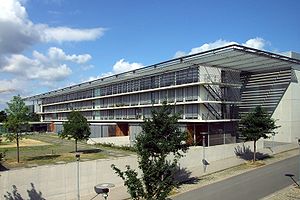- Max Planck Institute for Biophysics
-
The Max Planck Institute for Biophysics is located in Frankfurt am Main, Germany. It was founded as Kaiser Wilhelm Institute for Biophysics in 1937, and moved into a new building in 2003. It is one of 80 institutes in the Max Planck Society (Max Planck Gesellschaft).
Coordinates: 50°10′25″N 8°37′49″E / 50.17361°N 8.63028°E
An essential prerequisite for the understanding of the fundamental processes of life is the knowledge of the structure of the participating macromolecules. Two of the fourt departments are devoted to the challenging task of determining the structure of membrane proteins. Under the direction of Hartmut Michel (Nobel Prize in Chemistry of 1988 for the first structure determination of a membrane protein), the Department of Molecular Membrane Biology approaches this problem primarily by x-ray crystallography, whereas the Department of Structural Biology, headed by Werner Kühlbrandt, uses the complementary technique of electron microscopy. The Department of Biophysical Chemistry, directed by Ernst Bamberg, studies the function of these proteins in native or reconstituted membranes by electrophysiological and spectroscopic methods. The fourth department "Molecular Neurogenetics" under the direction of Peter Mombaerts has started its work in 2007. Since 2007, the institute hosts two Max-Planck Research Groups: "Computational Structural Biology", led by Lucy R. Forrest, and "Theoretical Molecular Biophysics", directed by José D. Faraldo-Gómez.
Since April 2003, the institute's four departments are housed in the same building, resulting in improved scientific interaction between the research groups. Scientific links to fellow researchers at Frankfurt University have been strengthened further as the institute is now situated next to the University's biology, chemistry and physics laboratories.
Together with the Max Planck Institute for Brain Research and the Goethe University of Frankfurt am Main the institute runs the International Max Planck Research School (IMPReS) on the Structure and Function of Biological Membranes, a graduate program offering a Ph.D.
A Note on the Institute's History
The institute was founded in Frankfurt as the "Kaiser Wilhelm Institute for Biophysics" in 1937. However, it had a predecessor, the "Institut für Physikalische Grundlagen der Medizin" which had been established in 1921 by Friedrich Dessauer, an admirer of Wilhelm Roentgen, who endeavored to apply radiation physics to medicine and biology. Being a conservative member of parliament for the democratic "Zentrumspartei", Dessauer opposed the National Socialists' rise to power and was then forced to emigrate in 1934. His successor, Dessauer's colleague and long-standing collaborator, Boris Rajewsky was the first director of the Kaiser Wilhelm Institute for Biophysics. Rajewsky firstly coined the term "Biophysics" and consequently the institute became one of the first to be known by this name.
External links
Categories:- Biophysics
- Max Planck Society
- Biological research institutes
- Research institutes in Germany
- 1937 establishments
Wikimedia Foundation. 2010.

